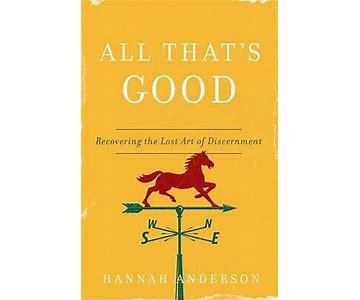All That’s Good: Recovering the Lost Art of Discernment
Hannah Anderson
–Review by Landrum P. Leavell III, Th.D.
Embracing discernment as part of God’s work of redemption is Anderson’s invitation in this book, seeing the world as He sees it, learning to navigate it with confidence and hope. “But what if God wants more for you than survival? What if He has a plan to restore the goodness of the world? What if you’re part of that plan?”
Hannah lives in the Blue Ridge Mountains of Virginia, working beside her husband in rural ministry, and the author of Made for More and Humble Roots. Her writing focuses on faith, culture, and spiritual formation.
The topic of discernment can make some people nervous, but Anderson points us toward good definitions and good practices to discern rightly. Wisdom has many sides, and this book is an accessible approach to the art of discernment. Her approach is grounded in God’s good creation, believing we need to reconsider how God is at work in His world. We have to develop a taste for God’s goodness. We are living in an age of tribalism and “fake news,” and Christ-followers must develop their discernment skills in order to follow Christ in spite of the challenges of this cultural moment. Good is often hidden within the world’s brokenness. Through her engaging storytelling, Hannah revives the lost art of discernment. As one reviewer put it, “Rather than telling us what to think, Hannah teaches us how to think—and with that skill, we are able to fully embrace the goodness of this life.”
Experiences, people, and objects all help us to understand the goodness of God. Anderson helps the reader to navigate life outside the garden, make sense of the bigger picture, and reflect God’s glory within human limits. She includes backstories and shadows with intentional variety, because for those who have eyes to see it, the earth is full of the Lord’s goodness.
The main body of the book deals with the apostle Paul’s “whatevers” from Philippians 4: “whatever is true, honorable, just, pure, lovely, commendable…” Each of these virtues traces its roots back to God’s own nature and how Jesus and Scripture reveal it to us. She shows us how far we are from these virtues ourselves, while showing how God preserves us in this world by making us holy—how He sanctifies us through His Word. “The genius of Paul’s advice is that if we seek these virtues in the things we consume, we will also end up transformed.” (58) These are “treasures of heaven.” “When we pursue goodness, He will make us good. And suddenly we come full circle. Suddenly we find ourselves in the center of the record. Suddenly we find ourselves changing.” (59)
Hannah has great stories on the history of pearls as well as the beginning of the coffeehouse. There’s no way to do justice to all of it, so I will simply include a number of the gems found throughout the book:
“Manhandled. What a perfect word to describe what has happened to God’s good world.” (39)
“…in order to be happy, we keep consuming, keep buying, keep indulging—but the whole time, the things we gain leave us empty even as we crave them all the more. We’re not victims of planned obsolescence as much as partners in it.” (51)
“It’s not simply that we have too much information; it’s that we have too little shared reality.” (66)
“It’s not that emotions are bad—indeed, they are good gifts from God. But emotions alone cannot guide us to truth.” (71) “We are relying on our feelings to do something that they were never intended or equipped to do.” (72)
“‘Does this deserve my time?’ disrupts these cultural forces long enough for us to entertain the possibility that not every innovation is an improvement, celebrities do not automatically deserve our consideration, and the latest news story may not be worth reading. We may not yet have figured out what is honorable, but we’ve stopped long enough to get our bearings.” (82)
“God does not intend us to use Scripture simply as leverage in our arguments with each other. The goal of Scripture is to teach us the best way to play the game. It teaches us how to move our pieces, what our goals should be, and how to interact with other players in a just way.” (100)
Regarding purity, “We don’t really understand how faithfulness in our intimate lives predicts and even leads to flourishing in our larger lives.” (113) “The solution to impurity is not simply abstinence or ignorance; it is to pursue whatever is pure.” (119)
Because discernment is learned best in community, the “Benediction” includes a brief review of each chapter, questions for reflection, further reading, and a proverb to memorize—in an effort to move these things from you head through your heart to your hands.
The mention of discernment for some can be a vague, nebulous subject, but Hannah Anderson gives us stories, images, tools, and biblical foundations to approach and apply this much-needed skill in our time and on our watch. All That’s Good is worth your time.
You’re welcome.


Thanks, Lan. I appreciate your thorough look at “All That’s Good.” Ms. Anderson’s book “Humble Roots” was reviewed at Open Table a while back. You are so right to say that she takes Christan virtues and gifts that are spoken about in Christian circles and gives them clothes to wear, shoes to walk in and work gloves to put on. Useful and beautiful, both.